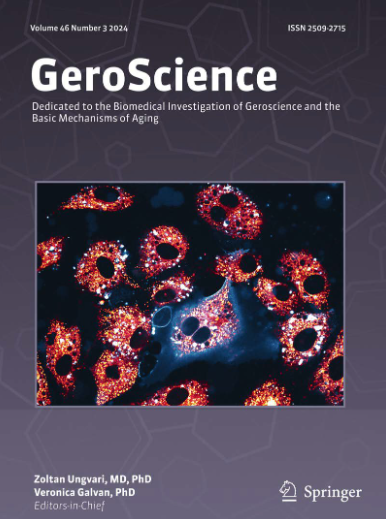Advancing clinical trial readiness in white matter disease and related dementias: key steps for future research progress.
IF 5.3
2区 医学
Q1 GERIATRICS & GERONTOLOGY
引用次数: 0
Abstract
White matter disease, a broad-spectrum term that covers various types of white matter lesions and degeneration, is strongly related to age-related neurodegenerative disorders including Alzheimer's disease (AD), and vascular contributions to cognitive impairment and dementia (VCID) and Alzheimer's related dementias (ADRD). There is no specific treatment for white matter disease. Therefore, basic research and clinical studies are essential for future outcomes. Since its formation in 2020, the Albert Research Institute for White Matter and Cognition (ARIWMC) mission has been to support white matter research by providing a forum for communication where basic and clinical scientists meet to discuss and debate new knowledge and guidelines for studying white matter in dementia. The 4th annual ARIWMC workshop was held on May 31-June 2, 2023, where researchers met to set strategies for clinical trial readiness. Significant discussion by participants advocated research on multiple levels, including molecular, cellular, metabolic, behavioral, and risk factors that contribute to disease etiology and regeneration processes. Moreover, participants also addressed identifying and validating biomarkers and functional studies in animal models and human trials that are key steps for treatment development. Other areas that were discussed included epidemiological studies and pragmatic clinical trials where health care researchers and everyday medical practice support risk factor management or healthy lifestyle, and prevention trials could mitigate the incident of the disease. In summary, this workshop fostered a better understanding of how white matter lesions contribute to cognitive impairment from bench-to-biomarker-to-bedside-to-translational approaches which will facilitate and support the discovery and development of therapies and prevention strategies that facilitate a healthy brain and reduce white matter-related pathologies associated with and contributing to VCID and ADRD.推进白质疾病和相关痴呆的临床试验准备:未来研究进展的关键步骤。
白质疾病是一个广泛的术语,涵盖了各种类型的白质病变和变性,与年龄相关的神经退行性疾病密切相关,包括阿尔茨海默病(AD)、血管性认知障碍和痴呆(VCID)以及阿尔茨海默病相关痴呆(ADRD)。对于白质疾病没有特殊的治疗方法。因此,基础研究和临床研究对未来的结果至关重要。自2020年成立以来,阿尔伯特白质与认知研究所(ARIWMC)的使命一直是通过提供一个交流论坛来支持白质研究,在这个论坛上,基础和临床科学家聚集在一起讨论和辩论研究痴呆症白质的新知识和指南。第四届ARIWMC年度研讨会于2023年5月31日至6月2日举行,研究人员开会制定临床试验准备策略。与会者进行了重要的讨论,主张从多个层面进行研究,包括导致疾病病因和再生过程的分子、细胞、代谢、行为和风险因素。此外,与会者还讨论了识别和验证生物标志物以及动物模型和人体试验的功能研究,这是治疗开发的关键步骤。讨论的其他领域包括流行病学研究和实用临床试验,其中保健研究人员和日常医疗实践支持风险因素管理或健康的生活方式,以及预防试验可以减轻疾病的发生。总之,本次研讨会促进了对白质病变如何导致认知障碍的更好理解,从实验到生物标志物到床边再到转化方法,这将促进和支持治疗和预防策略的发现和发展,从而促进健康的大脑,减少与VCID和ADRD相关的白质相关病理。
本文章由计算机程序翻译,如有差异,请以英文原文为准。
求助全文
约1分钟内获得全文
求助全文
来源期刊

GeroScience
Medicine-Complementary and Alternative Medicine
CiteScore
10.50
自引率
5.40%
发文量
182
期刊介绍:
GeroScience is a bi-monthly, international, peer-reviewed journal that publishes articles related to research in the biology of aging and research on biomedical applications that impact aging. The scope of articles to be considered include evolutionary biology, biophysics, genetics, genomics, proteomics, molecular biology, cell biology, biochemistry, endocrinology, immunology, physiology, pharmacology, neuroscience, and psychology.
 求助内容:
求助内容: 应助结果提醒方式:
应助结果提醒方式:


